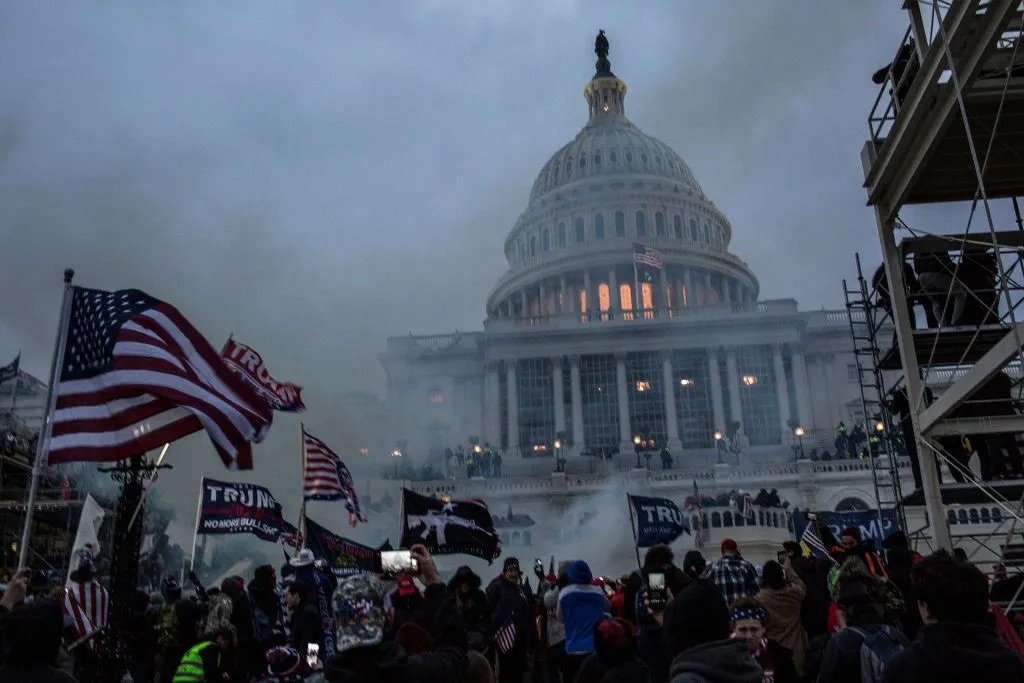"Embarrassingly Naive": I Expected America to Stand Up for Democracy



Trump leaves a campaign rally at Madison Square Garden in New York on Oct. 27, 2024. Photo by Angela Weiss/AFP via Getty Images
The choice voters made defies comprehension.
by John Harwood
I expected America to stand up and assert itself on Election Day. And it did, loudly and clearly.
It just wasn’t the America I held in my mind’s eye.
Voters handed the White House back to a leader devoid of virtue – a deranged, lawless con man who triumphed with a venomous campaign of lies, bigotry, and cruelty. Instead of hiding his darkest qualities, Donald Trump emphasized them.
A majority of the electorate responded, “Yes, please.” And they empowered him with a Congress that, barring a surprise flip of the House once ballot counting concludes, will have neither inclination nor incentive to restrain him anytime soon.
That means a free hand for Trump to begin rounding up millions of immigrants, placing them in camps, and then deporting them. A free hand to impose sweeping tariffs that would jump-start inflation once again. If implemented, both would have ruinous effects on the economy of the United States and the world.
It means a free hand to seize control of the federal bureaucracy and turn it into his personal instrument for self-enrichment and revenge upon his enemies in the realms of politics, journalism, and business. A free hand to corrupt the Justice Department and escape criminal accountability. A free hand to confer authority for public health and the environment on anti-science cranks.
It means a free hand to weaken democracies around the world by abandoning America’s commitment to defending free governments and protecting the weak from the strong. That represents an enormous advance for the authoritarian regimes in Russia, Trump’s longstanding benefactor, and China – both of which now have much more leeway for aggression against Ukraine and Taiwan, among other targets. Benjamin Netanyahu’s government in Israel, which had mostly ignored President Joe Biden’s appeals to spare Palestinian lives in its military campaign against Hamas in Gaza, won’t even hear such appeals from Trump.
If you’re accustomed, as I am, to believing that a critical mass of Americans embraces the values of freedom, pluralism, and common sense, the choice voters made defies comprehension. The arc of history in 2024 bent not toward justice, as Martin Luther King Jr. liked to say, but away from it.
Why Trump Prevailed
Pinpointing the cause is impossible because no singular factor accounts for the outcome. The broadest explanations are the most comforting.
President Biden has suffered dismal approval ratings for most of his term. Even after the 81-year-old incumbent abandoned his re-election bid under intra-party pressure over the summer, his unpopularity damaged Vice President Kamala Harris when she took his place.
Harris introduces Biden during a campaign rally at Girard College on May 29, 2024, in Philadelphia, Pennsylvania. Photo by Andrew Harnik/Getty Images
At the most basic level, unhappy voters wanted change. Similar discontent has shaken governments in Britain and other countries in the wake of the coronavirus pandemic.
Dissatisfaction with the economy undoubtedly played a large role, even if the Biden administration boasts the strongest economic performance among our peer nations. After decades of stable prices, resurgent inflation angered and unsettled millions of Americans, even though it was an inescapable global phenomenon and returned to normal levels over the past year.
Hostility toward social change loomed large as well. White Christians, increasingly anxious about their place in society as their numbers shrink, have long embraced Trump’s nostalgia for the religious, racial, and gender hierarchies of mid-20th century America. They provided a receptive audience for his racist condemnation of immigrants from Latin America and elsewhere.
Yet a significant chunk of Latino voters, too, moved toward Trump. That reflects the cultural conservatism of a largely-Catholic constituency: unhappy with the scale of illegal immigration over the last four years, drawn to the Republican message of stricter law enforcement and stronger incentives for small business, uneasy with the Democrats’ emphasis on abortion rights.
Since the Supreme Court struck down the constitutional right to abortion in 2022, Democrats had drawn encouragement from their better-than-expected showing in that year’s mid-term campaign and subsequent special elections. Exit polls – an imprecise preliminary x-ray of the Election Day body politic – showed that Harris improved upon Biden’s 2020 vote with the white college graduates who favor abortion rights especially strongly. (Subsequent, more accurate vote analyses may alter our understanding of demographic breakdowns.)
But Trump offset those losses with gains among non-whites, most conspicuously Latino men. He lost ground among senior citizens; she lost more among young voters.
In her 2016 bid to become America’s first female president, Hillary Clinton beat Trump by seven percentage points among white women with college degrees, the constituency that benefited most from decades of feminist advances. Harris appears to have doubled Clinton’s margin among those women. But she came no closer to the breakthrough Clinton sought.
“Embarrassingly Naive”
The deadly Jan. 6 insurrection that Trump incited to overturn his 2020 defeat became a rallying cry for Americans alarmed about the threat he posed to constitutional democracy itself. They included not just Democrats but also some prominent Republicans, including former senior aides in Trump’s earlier administration. His ex-White House chief of staff, retired Marine Gen. John Kelly, denounced Trump as a fascist.
Security forces respond with tear gas after Trump supporters breached the US Capitol security on Jan. 6, 2021. Photo by Probal Rashid/LightRocket via Getty Images
But the democratic process, not authoritarian coercion, sent Trump back to the Oval Office this time. State and local officials around the country conducted elections smoothly and safely. The Democratic governors who hold power in five of the seven decisive battlegrounds did not interfere; neither did the Democratic administration in Washington.



